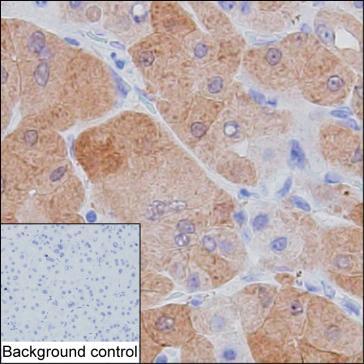
| WB | 咨询技术 | Human,Mouse,Rat |
| IF | 咨询技术 | Human,Mouse,Rat |
| IHC | 1/50-1/200 | Human,Mouse,Rat |
| ICC | 技术咨询 | Human,Mouse,Rat |
| FCM | 咨询技术 | Human,Mouse,Rat |
| Elisa | 1/2000-1/5000 | Human,Mouse,Rat |
| Host/Isotype | Mouse IgM |
| Antibody Type | Primary antibody |
| Storage | Store at 4°C short term. Aliquot and store at -20°C long term. Avoid freeze/thaw cycles. |
| Species Reactivity | Human |
| Immunogen | Purified recombinant fragment of human GSTA1 |
| Formulation | Purified antibody in PBS with 0.05% sodium azide |
+ +
以下是关于EDA抗体的示例性参考文献(内容为模拟概括,建议通过学术数据库查询真实文献):
1. **"Ectodysplasin signaling in development and disease"**
*Author: Kere J. et al.*
摘要:探讨EDA蛋白在皮肤、牙齿等外胚层器官发育中的关键作用,及其基因突变导致的外胚层发育不良症机制,提及抗体的检测应用。
2. **"EDA-deficient mice reveal dual roles in ectodermal organ development"**
*Author: Headon D.J. et al.*
摘要:通过EDA基因敲除小鼠模型,研究EDA蛋白缺失对毛发、汗腺发育的影响,利用特异性抗体定位蛋白表达模式。
3. **"Molecular interactions of EDA-A1 with its receptor EDAR"**
*Author: Schneider P. et al.*
摘要:解析EDA-A1蛋白与受体EDAR的结合机制,使用单克隆抗体阻断信号通路,阐明其在NF-κB通路激活中的作用。
4. **"Therapeutic potential of EDA replacement therapy in X-linked hypohidrotic ectodermal dysplasia"**
*Author: Gaide O. et al.*
摘要:评估重组EDA蛋白抗体替代疗法在动物模型中的效果,证明其可部分恢复汗腺和毛发发育功能。
提示:以上为示例,实际文献需通过PubMed/Google Scholar检索关键词(如"EDA antibody"、"ectodysplasin therapy")。
EDA antibodies target the ectodysplasin-A (EDA) protein, a tumor necrosis factor (TNF) family member critical in ectodermal development. The EDA gene encodes two splice variants, EDA-A1 and EDA-A2. which bind to receptors EDAR and XEDAR, respectively, activating NF-κB and JNK signaling pathways. These pathways regulate the formation of skin appendages, including hair follicles, sweat glands, and teeth. Mutations in EDA are linked to X-linked hypohidrotic ectodermal dysplasia (XLHED), a disorder characterized by sparse hair, missing teeth, and impaired sweat gland development.
EDA antibodies are primarily used in research and diagnostics to study EDA expression, receptor interactions, and pathway dysregulation in XLHED. They also hold therapeutic potential. For instance, recombinant EDA protein or agonist antibodies mimicking EDA-A1 have been explored to rescue developmental defects in animal models and human clinical trials. Prenatal or neonatal administration of such agents may restore sweat gland function and mitigate XLHED symptoms.
Additionally, anti-EDA antibodies aid in understanding ectodermal pathologies, cancer (e.g., ectodysplasin overexpression in certain tumors), and autoimmune conditions. Their role in modulating EDA signaling pathways underscores their relevance in both developmental biology and targeted therapy development.
×